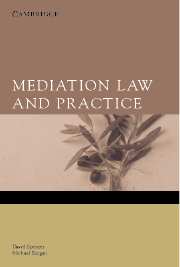Book contents
- Frontmatter
- Contents
- Acknowledgements
- Preface
- List of tables and figures
- Table of statutes
- Table of cases
- PART I THE PRACTICE OF MEDIATION
- 1 Mediation: Its Definition and History
- 2 The Mediation Process
- 3 The Theory and Philosophy of Mediation
- 4 Specific Types of Mediation
- 5 The Mediator
- 6 The Ethics of Mediation
- 7 Power, Empowerment and Difference in Mediation
- PART II THE LAW OF MEDIATION
- Bibliography
- Index
6 - The Ethics of Mediation
Published online by Cambridge University Press: 05 June 2012
- Frontmatter
- Contents
- Acknowledgements
- Preface
- List of tables and figures
- Table of statutes
- Table of cases
- PART I THE PRACTICE OF MEDIATION
- 1 Mediation: Its Definition and History
- 2 The Mediation Process
- 3 The Theory and Philosophy of Mediation
- 4 Specific Types of Mediation
- 5 The Mediator
- 6 The Ethics of Mediation
- 7 Power, Empowerment and Difference in Mediation
- PART II THE LAW OF MEDIATION
- Bibliography
- Index
Summary
Introduction
If we spend the time to think about things it is clear that matters of ethics are pervasive in all walks of life. When it comes to professional activities such as lawyering, or mediating, it is clear that ethical issues exist and need careful consideration because of the role or position of power that lawyers and mediators have. In this chapter we will discuss ethical issues as they apply to mediations, lawyers and mediators. We will examine ethical issues in mediations generally before considering the impact of mediation and ethics on members of the legal profession who choose to act as mediators, or act for their clients in mediations. In so doing we will address the professional ethical rules that affect legal practitioners, particularly in relation to the giving of advice in an adversarial system of law. Finally, we examine the role of codes of ethics for professional bodies and propose matters for consideration in the development of a code of ethics for mediators in Australia.
Ethics and mediation
Ethics generally
The reason that people and organisations engage in conflict with one another are many and varied. Sometimes it will be because of different interpretations of the same events, or different effects of those events on different parties. Many times parties feel that there are moral, or ethical, issues at stake and that they must stick to their position ‘on principle’.
- Type
- Chapter
- Information
- Mediation Law and Practice , pp. 182 - 222Publisher: Cambridge University PressPrint publication year: 2007



